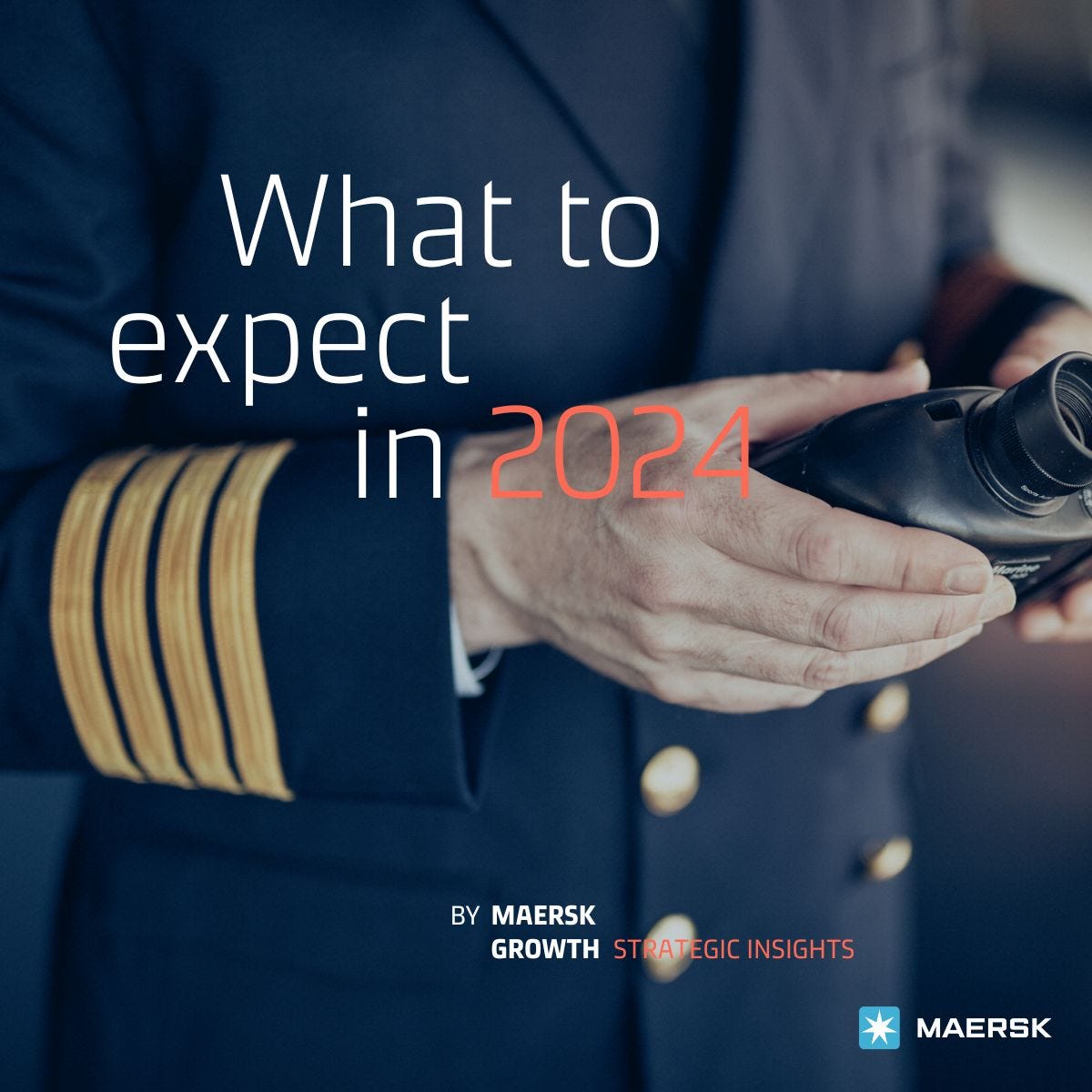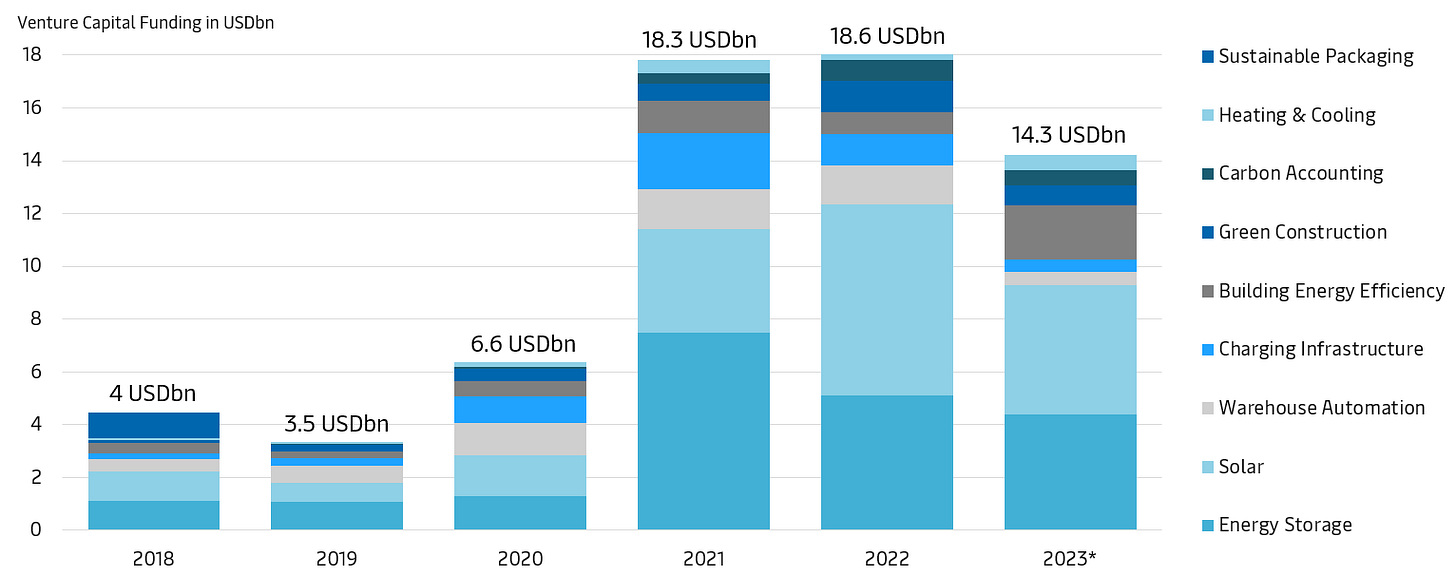Looking ahead: The year of fruitful start-up corporate partnerships!
From COP28 to warehouse decarbonisation, Gateway to Growth will cover everything that sparked our interest and steered our conversations throughout the 2 months that flew by us. Have a pleasant read!
2023 reflections and looking ahead
In hindsight, the journey often appears more straightforward than it was in reality. As we reflect on 2023, that is exactly how we feel in Maersk Growth. If comparing the past year with a cross-Atlantic voyage, the weather forecast promising easy waters and wind in the sails only applied the first few months of the journey. During summer, a current rose, and despite neither the captain nor crew ever seeing it as more than a reason to sharpen their focus, some watching from the quayside found it slightly more alarming. Though with a spotless final stretch and an improved navigation system, the ship, captain, and crew proved the skeptics wrong.
We apologise for the somewhat metaphorical language, but 2023 was indeed a transformative year for Maersk Growth defined by our new direction. As announced in June our unit got one step closer to the core business as we moved under the strategy function of Maersk, anchoring Maersk Growth in central business processes to accelerate our investment and strategic partnership efforts. We redefined our investment focus to exclusively encompass decarbonisation, and we received a stronger mandate to establish strategic partnerships with supply chain tech companies through proof-of-concept collaborations.
Throughout 2023, we made 15 investments, as we welcomed BoxBot, Arrive, Methanology, Blue World, and Captura to our portfolio, together with a handful of follow-on investments. We ended the year with several active PoC collaborations, a promising pipeline, and significant interest from internal teams. The strategic partnership funnel of Maersk Growth only looks to pick up speed in 2024.
None of the above was in the cards 12 months ago – and we have therefore taken some time to speak with Graham Slack, Chief Economist, Ashish Saxena, VP of Logistics & Services Platforms, and Scott Horn, VP of Logistics & Services Technology to hear their reflections on 2023. Looking ahead, we have prepared two articles on What to expect in 2024 – supply chain tech startup trends and What to expect in 2024 – 5 megatrends for digitalisation in supply chains.
What we’ve learned from the events we’ve attended?
The final events of the season ranged from cross-industry inspiration at Web Summit in sunny Lisbon to the coolness of Slush in snowy Helsinki and high UV in the UAE and COP28, where we met, introduced, and engaged with a long list of inspiring founders, startups, investors, and like-minded people shaping our industry. Here is our debrief/learnings!
The growing spotlight on climate investments and financing for hardware-based solutions was not missed at Slush. It was excellent to see the growing discourse around FOAK funding and discussions around the unique support investors can offer to founders in the Climate Tech space. Our key takeaway: Efforts to decarbonise through investments in climate tech must continue. If you are keen on sparring on these topics, please feel free to reach out!
Artificial Intelligence continued to be a driving force at Slush 2024, showcasing breakthroughs that go beyond traditional applications. Discussions at the event emphasised the significance of ethical AI development, with entrepreneurs and thought leaders stressing responsible practices, transparency, and fairness to ensure AI benefits humanity without unintended consequences. The event underscored the growing integration of AI across diverse industries, from manufacturing and finance to entertainment and transportation, showcasing its versatility in optimising processes and creating new possibilities. We look forward to following this space!
The highlight of our experience at COP28 was attending several insightful panel discussions about increasing adoption and funding for alternative fuel projects in the shipping and aviation industries. The deep impact that transportation and shipping have on emissions necessitates cross-value chain collaboration, and players across the board need to come together to share the risk and rewards of investing in technologies for decarbonisation.
During COP28 we also shared another monumental milestone in our journey towards fostering sustainable shipping solutions as it has been announced that we officially joined forces with Blue World Technologies, participating as co-investors in an impactful pre-C-round alongside the Export and Investment Fund of Denmark, Cycle Group, and other reputable financiers.
Picture 1: The Blue World team and our colleague Alexa Rios at COP28.
Our team also just returned from some exhilarating days in the UK. A highlight was joining the Dexory Supply Chain Fast Track event where they gathered peers from the logistics industry at Red Bull Racing & Red Bull Technology. In a power-packed program, we explored adoption and trends within warehouse robotics, AI, and technology more broadly, how to operationalise circularity, as well as parallels between F1 Racing and Logistics.
Together with AlbionVC we at Maersk Growth also co-hosted a Supply chain dinner in London, where we were joined by HIVED, Dexory, Again, Altana, Loadsure, Procure AI, Solvo.ai, Red Sky as well as Sapphire Ventures. We truly appreciated the candid, insightful conversations and shared experiences - and look forward to repeating the success!
Where we’re going to next?
In a few weeks, we will kick off the first conference of 2024 as Alexandra will fly to Las Vegas for Manifest: The Future of Supply Chain & Logistics from Feb 5th to 7th.
“I’m thrilled to be part of Manifest, where innovation in logistics takes center stage! I'm eagerly anticipating the event, meeting with dynamic start-ups and engaging with visionary peers to discuss how we work to revolutionise the logistics space.”
Will you be there too? Feel free to connect with Alexandra!
Green warehouses of tomorrow: Exploring decarbonisation tech trends
Traditional warehouses, responsible for ~11% of emissions in the global transport and logistics sectors (which account for around one fourth of global emissions), are undergoing a transformative journey. By adopting innovative solutions, such as building energy efficiency solutions, companies can not only reduce their carbon footprints but also significantly lower energy costs. The focus on carbon-efficient processes at logistics facilities has recently gained significant traction driven by two key stakeholder groups:
Governments: Regulatory changes and market demands, such as the European Energy Efficiency Directive, are pushing for more energy-efficient buildings.
Customers: Consumers increasingly seek to minimise their indirect carbon footprint (scope 3), demanding low-carbon and environmentally responsible logistics operations.
As supply chain companies embrace net-zero pledges, warehousing companies are compelled to follow suit in relation to green solutions and the circularity of packaging to remain competitive in today's evolving market. Companies within this industry strive to leverage technologies to help reduce emissions at warehouses to meet changing demands, as illustrated below.
Figure 1: Examples of tech opportunities within warehouse decarbonisation.
Let’s delve into the dynamic investment landscape of the warehouse decarbonisation industry, where diverse tech advancements hold a transformative position. From 2018 onwards, these innovative solutions have attracted a remarkable USD 65bn in venture capital investments (see Figure 2). Specifically, solar and energy storage companies have significantly contributed to the surge observed from 2021-2023 compared to the period of 2018-2020. This funding boom can be explained by the global shift towards renewable energy, fuelled by the growing popularity of electric vehicles and the supportive measures of the Inflation Reduction Act, which has provided significant support for energy storage companies. The boom in funding opens up promising opportunities for warehouses to reduce their carbon footprint. By adopting these innovative technologies, warehouses can efficiently store renewable energy and enable its utilisation at times of peak energy demand.
Furthermore, the warehouse decarbonisation tech sector has witnessed promising advancements, with sustainable steel and cement production pioneers like H2 Green Steel, Boston Metal, and CEMEX leading the way. Energy efficiency software, particularly in cold storage facilities and automated fulfillment centers, represents another compelling tech area, exemplified by energy optimisation software startups Ento Labs and SnoFox.
Figure 2: Venture Capital Funding Raised in Warehouse Decarbonisation Related Tech Areas, since 2018.
Source: Pitchbook investment data and Maersk Growth analysis.
Note: 2023*, all relevant venture funding in 2023 Q4 is still not registered.
We see three particularly intriguing trends shaping the warehouse decarbonisation landscape:
Embrace automation and electrification: As warehouses electrify their operations (trucks, forklifts, etc.), long-duration energy storage solutions like gravity storage play a crucial role in ensuring a reliable energy supply. Energy Vault, a frontrunner in this industry, is at the forefront of advancements, partnering with industry leaders like Enel Green Power to bring these solutions to market.
Harness the power of microgrids: Microgrids offer resilience in the face of power outages, enabling warehouses to operate seamlessly even when the public grid is disrupted or due to limited electricity in remote areas. By harnessing solar energy and storage, warehouses can achieve energy independence, generating, storing, and managing their own energy needs. Additionally, emerging microgrid management platforms like SwichDin are revolutionising energy management in warehouses, orchestrating and optimising the flow of energy from DERs, including solar and battery systems, while monitoring, controlling, and forecasting the energy needs of various assets.
Adopt circular packaging technologies: Circular packaging technologies promote a more circular economy, reducing reliance on single-use materials and diverting waste from landfills. Companies in industries like fashion and consumer electronics are at the forefront of circular initiatives, leveraging visibility and recycling technologies to optimise packaging design, track materials, and facilitate efficient recycling processes. As a result, warehouses may need to undergo adaptations to handle the growing volume of secondary raw materials, such as fabric scraps, reprocessed lubricants, and other post-consumer and post-industrial waste.
These are just a few examples of the transformative technologies emerging in the warehouse decarbonisation sector, with the potential to revolutionise how warehouses operate and contribute to a more sustainable future. At Maersk Growth, we actively follow the innovation ecosystem with a keen interest in staying informed about the latest developments that could potentially bolster our industry's efforts to reduce carbon footprint in the future.
Stay connected!
Subscribe to our bi-monthly newsletter and follow our page on LinkedIn for frequent updates on all things supply chain and climate tech.
Are you a startup working to solve the challenge of how to decarbonise logistics, or a supply chain tech startup looking to get in touch regarding a potential PoC collaboration with Maersk? Contact us via growth@maersk.com!








